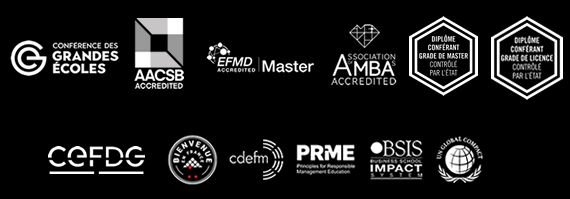Through visits, workshops and curated learning experiences across Paris, MSc Luxury & Innovation Management participants explored French heritage, craftsmanship and innovation. These activities support a deeper understanding of how luxury brands articulate culture, creativity and strategic transformation.
This series of visits reflects the programme’s objective: connecting academic knowledge with industry contexts to understand the evolving landscape of luxury in France.
Luxury Experiences in Paris: A Collection of Practical Learning Opportunities
The MSc Luxury & Innovation Management programme integrates a series of field-based learning experiences that anchor academic concepts in real industry contexts.
The workshop Les Deux Mains du Luxe introduced participants to the craftsmanship and technical expertise upheld by Comité Colbert Maisons through hands-on demonstrations and discussions with artisans.
The visit to Fragonard’s Perfume Museum offered an overview of fragrance creation, combining chemistry, design, branding and the historical role of Grasse in global perfumery. At the Renault Défilé on the Champs-Élysées, students analysed how a heritage automotive brand connects innovation, sustainability and French design within a contemporary vision of luxury mobility.
The visit to Palais Galliera provided an in-depth perspective on the Rick Owens: Temple of Love retrospective, highlighting the intersection of fashion, architecture and artistic identity in the evolution of luxury.
The exhibition dedicated to the Orient Express at the Musée des Arts Décoratifs explored travel heritage, Art Deco aesthetics and the reinterpretation of iconic design for future hospitality experiences. Finally, the broader visit to the Musée des Arts Décoratifs examined how French maisons collaborate with cultural institutions to present craftsmanship, design innovation and the role of heritage as a strategic lever in the luxury sector.
Hands-on Insight into Craftsmanship at Les Deux Mains du Luxe
As part of the French Luxury Heritage module, MSc Luxury & Innovation Management participants attended Les Deux Mains du Luxe at the Grand Palais. Organised by Comité Colbert, the event brought together leading maisons, cultural institutions, and artistic schools that represent French art de vivre.
Technical demonstrations, craft workshops and exchanges with artisans and HR representatives provided a learning environment centred on savoir-faire, innovation and sector dynamics. Conferences led in partnership with Le Monde addressed creativity, the future of luxury professions and training pathways.
This workshop supported key learning objectives: understanding how craftsmanship and meticulous processes shape luxury; analysing brand storytelling; and reflecting on innovation, sustainability, and material expertise.

Exploring Fragrance Culture at Fragonard’s Perfume Museum
During a visit, students examined perfume as a cultural, scientific and economic pillar of the French luxury sector. Located near Opéra Garnier, the Musée du Parfum Fragonard showcases the evolution of perfumery and the heritage of the maison founded in Grasse in 1926.
The workshop combined perspectives from chemistry, history and visual culture. Participants observed natural and synthetic compounds, design practices, and branding strategies specific to the fragrance industry.
The session aligned with programme goals: understanding sector-specific innovations, analysing positioning strategies and recognising the expertise required to craft and evaluate fragrances.

Luxury, Mobility and Design at the Renault Défilé on Champs-Élysées
On the same day, as part of the French Luxury Heritage module, students explored Renault’s exhibition on the Champs-Élysées. The visit showcased how automotive design intersects with luxury values, combining technological advancement, sustainability initiatives and French industrial heritage.
The exhibition highlighted Renault’s vision of modern mobility, its use of design as a cultural influence, and its approach to integrating innovation into a legacy brand.
The learning sequence addressed the relationship between luxury and technology, brand evolution in competitive global markets and the role of design in shaping contemporary mobility.

Fashion, Heritage and Avant-Garde at Palais Galliera
The visit to Palais Galliera focused on Rick Owens: Temple of Love, the first large-scale retrospective dedicated to the American-born, Paris-based designer. The exhibition presents over three decades of Owens’ work, examining the dialogue between fashion, architecture and subculture.
Through immersive scenography and large-scale installations, students analysed how contemporary creators contribute to French fashion heritage while shaping new aesthetic codes.
The learning objectives emphasised understanding how international designers integrate into the French luxury ecosystem, the role of museums in preserving fashion heritage and the contribution of haute couture to cultural influence.
The Orient Express Exhibition at Musée des Arts Décoratifs
The group also attended the temporary exhibition dedicated to the Orient Express at the Musée des Arts Décoratifs. The experience highlighted the Art Deco legacy of the historic train and its redesign for 2027 under Maxime d’Angeac, architect and artistic director of Orient Express within the Accor group.
This visit illustrated how transport, hospitality and interior architecture converge to form a luxury experience. Students examined heritage, craftsmanship and experiential travel as core components of luxury brand management.
Key learning objectives included connecting heritage with contemporary luxury travel, understanding design strategies and analysing how iconic brands adapt their legacy for future audiences.

Curating Luxury Heritage at Musée des Arts Décoratifs
The second part of the visit examined how the museum collaborates with maisons such as Dior, Chanel, and Louis Vuitton to showcase craftsmanship, design evolution, and French cultural influence. Located within the Louvre Palace, the institution illustrates how cultural heritage contributes to national prestige and acts as a form of soft power.
Students explored curatorial practices, exhibition storytelling and collaborations between cultural institutions and luxury brands.
These insights supported analytical skills essential for understanding brand legacy, cultural positioning and the influence of design on consumer perception.
MSc Luxury & Innovation Management at EMLV
The MSc Luxury & Innovation Management provides a comprehensive approach to understanding a sector shaped by heritage and transformation.
The programme combines insights into craftsmanship and cultural identity with digital innovation, sustainability and new business models.
Supported by EMLV’s expertise in management and new technologies, the MSc prepares participants to analyse market trends, address emerging challenges and understand the strategic role of innovation within luxury ecosystems.






















